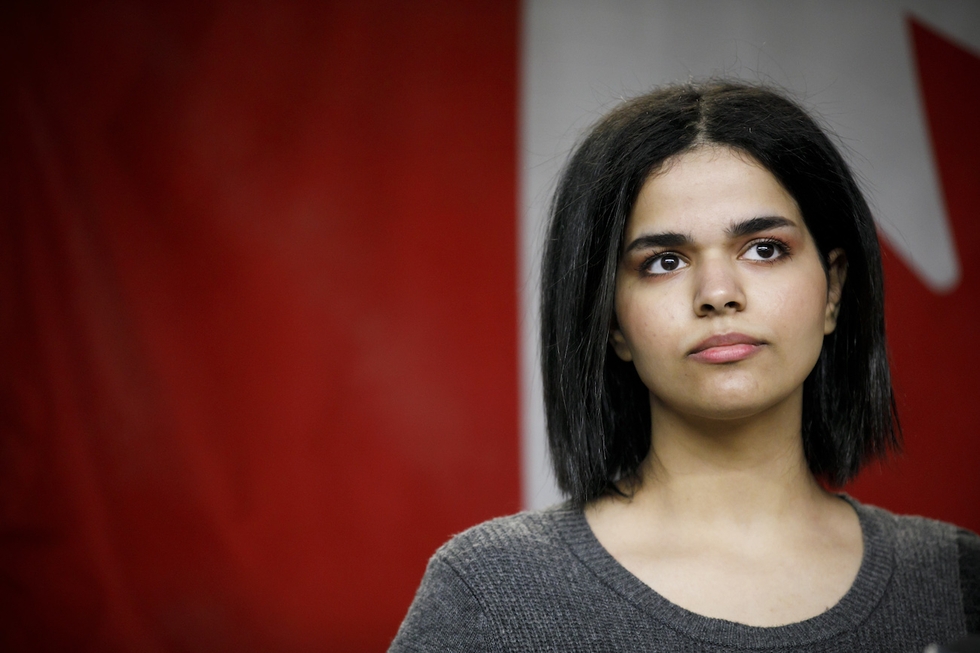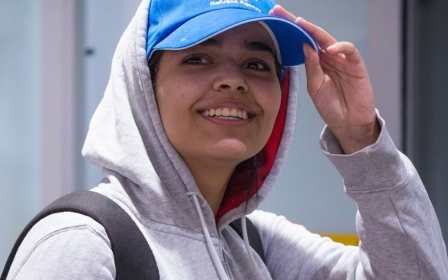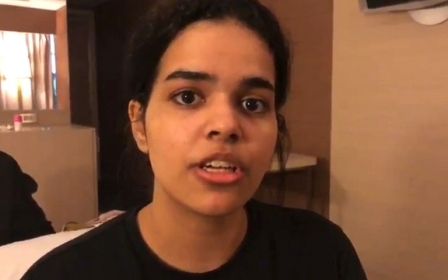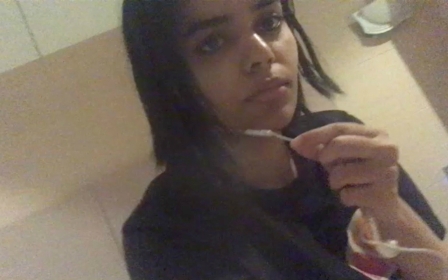'I am one of the lucky ones': Rahaf al-Qunun vows to defend women's rights

MONTREAL, Canada - Rahaf Mohammed al-Qunun says she's "one of the lucky ones".
The Saudi teenager, who drew international headlines after fleeing an abusive family situation, landed in Toronto over the weekend after the Canadian government accepted the United Nations' request to grant her asylum and fast-tracked her resettlement.
In her first public statement since arriving in Canada, the 18-year-old thanked her supporters on Tuesday while acknowledging that many Saudi women may not be as lucky.
“I know that there are unlucky women who disappeared after trying to escape or who could not do anything to change their reality," said Mohammed, who has dropped al-Qunun from her name because her family has disowned her, CBC News reported.
"When I heard the news from [UN refugee agency] UNHCR that Canada was selected as my new home, the stress that I felt over the last week melted away," she said during a press conference in Toronto, which CBC News broadcast live online.
She read out a statement in Arabic and an aide delivered an English-language translation of her comments moments later.
“I was not treated respectfully by my family and I was not allowed to be myself and who I want to be," she told reporters.
'I was not allowed to be myself'
The 18-year-old's story has captivated people around the world, after she landed in Thailand in transit from Kuwait earlier this month and refused to be deported, saying she feared her family would hurt her if she were forcibly returned to them.
Mohammed barricaded herself inside a hotel room at Bangkok's Suvarnabhumi airport and shared her demands for asylum in live videos posted to social media.
Thailand relented, saying it wouldn't deport her amid the international pressure, and a short time later UNHCR granted Mohammed refugee status.
I want to be independent, travel, make my own decisions - on education, a career, or who and when I should marry
- Rahaf Mohammed
In Tuesday's press conference, the teenager criticised Saudi Arabia's strict guardianship laws, which force Saudi women to get approval from a male relative to complete basic tasks and make decisions related to education, work, marriage and more.
Most women in the Gulf kingdom "can’t be independent and they need the approval of their male guardian for everything", she said.
"Any woman who thinks of escaping or escapes will be at risk of persecution. I want to be independent, travel, make my own decisions - on education, a career, or who and when I should marry," Mohammed said.
"I had no say in any of this. Today I can proudly say that I am capable of making all those decisions."
While Mohammed's family previously denied mistreating her, in an interview with CBC News on Monday, the teenager said she was physically and mentally abused by her family since age 16, and that she thought about escaping for years.
"I was exposed to physical violence, persecution, oppression, threats to be killed. I was locked in for six months," Mohammed told the Canadian public broadcaster, as she described what happened after she cut her hair.
"I felt that I could not achieve my dreams that I wanted as long as I was still living in Saudi Arabia."
Questions over resettlement process
Canada's decision to grant Mohammed asylum - with such speed and under such extraordinary circumstances - has been welcomed by human rights groups and the United Nations, which thanked Ottawa in a statement on Friday.
"Ms al-Qunun’s plight has captured the world’s attention over the past few days, providing a glimpse into the precarious situation of millions of refugees worldwide," said UN High Commissioner for Refugees Filippo Grandi, as news broke that Mohammed was en route from Bangkok to Toronto.
"Refugee protection today is often under threat and cannot always be assured, but in this instance international refugee law and overriding values of humanity have prevailed."
Her resettlement was also hailed as "a victory for everyone who cares about women’s rights, values youth boldly seeking change, and demands that governments operate in light and not darkness", Human Rights Watch senior researcher Sunai Phasuk said.
Some have linked the Canadian government's motives for accepting Mohammed to its recent diplomatic standoff with Saudi Arabia.
That spat kicked off last year when Canada's Minister of Foreign Affairs Chrystia Freeland tweeted for the Saudi authorities to immediately release detained women's rights activists.
The Saudi government responded by kicking the Canadian ambassador out of the country and accusing Ottawa of meddling in its internal affairs.
The kingdom also demanded a public apology from Canada, which instead doubled-down, insisting that it would continue to speak out on human rights issues around the world, including in Saudi Arabia.
Freeland personally welcomed Mohammed at Toronto's Pearson International Airport on Saturday, handing the teenager a bouquet of flowers and welcoming her as a "brave new Canadian".
Security concerns
Some have also raised questions about the alleged preferential treatment Mohammed received.
Refugees often have to wait years to have their asylum claims processed in Canada, which is facing a serious backlog in its immigration system, and even longer still before they can be resettled.
Still, Mohammed is receiving the same type of support given to other government-sponsored refugees that have been resettled in Canada, said Mario Calla, executive director of COSTI Immigrant Services in Toronto.
A local resettlement support agency on contract with the federal government, COSTI will help her find temporary lodging, apply for health coverage and a social insurance number, open a bank account, and learn to get around Canada's largest city, Calla explained.
Later, Mohammed will get help to enroll in English-language courses and find more permanent accommodation, he said during Tuesday's press conference.
Safety issues
Ensuring her safety in Toronto is also an issue, Calla told reporters, and COSTI has hired security guards to be posted where she is staying.
"We are concerned about her security," Calla said.
"She has had threats on social media. She has taken a position that some taking issue with. I have not seen the threats, but she’s said yes, she was feeling unsafe, and so we have taken those measures."
But for her part, Mohammed said being in Canada means the possibility of a fresh start.
"I would like to start living a normal, private life, just like any other young woman living in Canada," she told reporters.
"Today and for years to come I will work in support of freedom for women around the world - the same freedom I experienced on the first day I arrived in Canada."
This article is available in French on Middle East Eye French edition.
Middle East Eye propose une couverture et une analyse indépendantes et incomparables du Moyen-Orient, de l’Afrique du Nord et d’autres régions du monde. Pour en savoir plus sur la reprise de ce contenu et les frais qui s’appliquent, veuillez remplir ce formulaire [en anglais]. Pour en savoir plus sur MEE, cliquez ici [en anglais].




